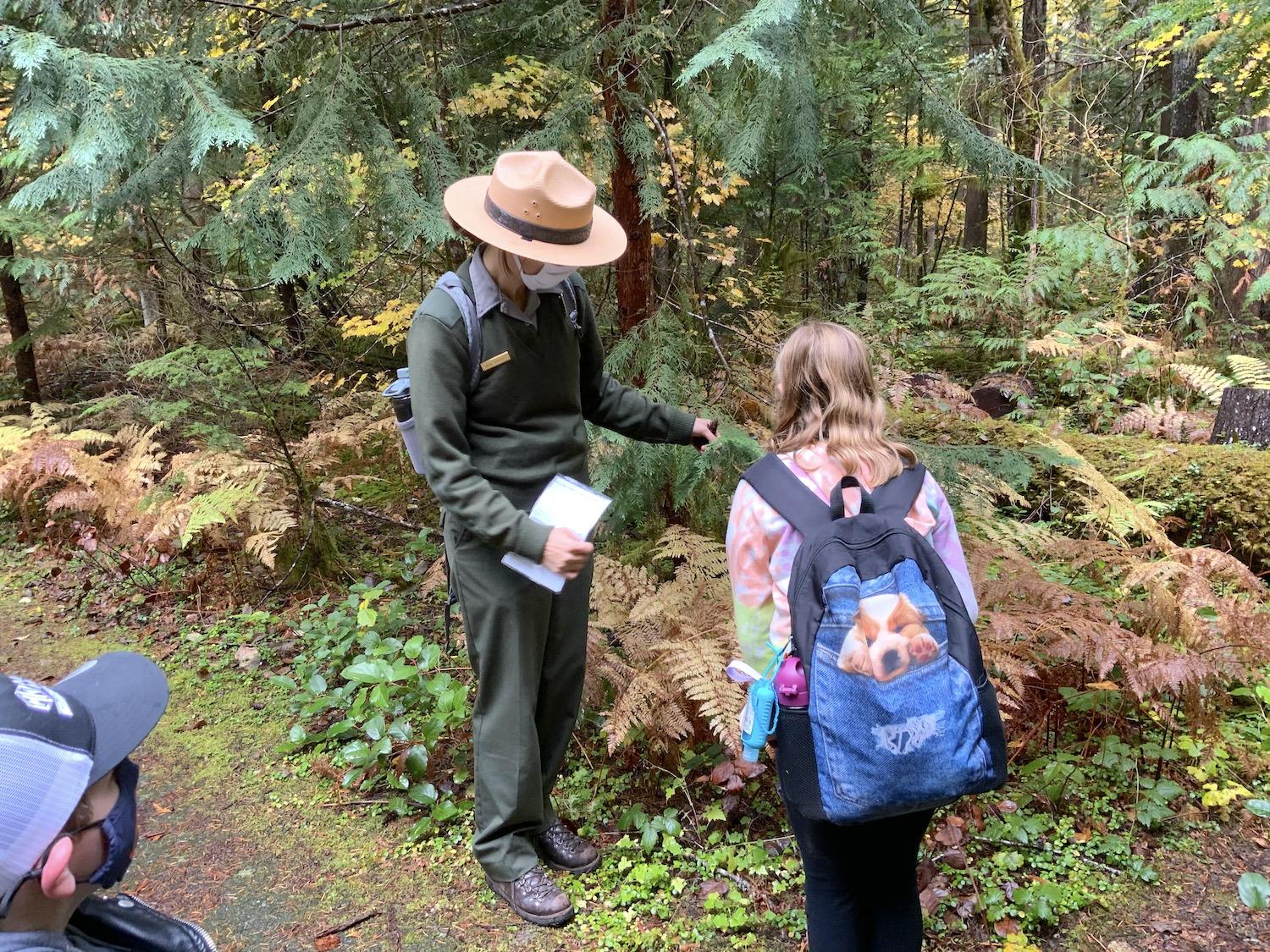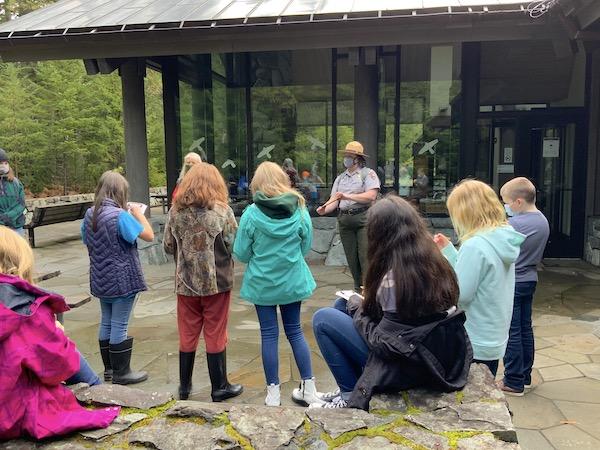
Field trip participants learn about forest ecosystems in the North Cascades/NPS
Growing The Seeds Of Community Resilience In The North Cascades
By Jen Semsak, Board Member of Washington’s National Park Fund
More sunshine, warmer temperatures, longer days, and birdsong at dawn build our excitement for spring. And no one is more joyous than a gardener. Or in this case, the gardeners at the Darrington School Greenhouse in northwestern Washington state.
A warm day in late February helped these gardeners raise new bed frames and prepare existing ones for the students’ spring planting. These beds will build more than native plants and young minds; they will build community, too.
The Food Sustainability and Native Plant Education pilot program at North Cascades National Park began as a dialogue several years ago on how to reach populations the park doesn’t serve as much as it would like – including local gateway communities, underserved youth, and tribes. In discussion with local partners, it was discovered that food security was an issue of concern in the community, as well as a lack of knowledge of traditional foods and uses.

Youth participants enjoy an outdoor experience/NPS
Thus, this program was developed to build a hands-on project to learn skills to contribute to and maintain gardens for food sustainability and sovereignty.
Launched in 2020 with funding from Washington’s National Park Fund donors, the project aims to provide educational outdoor experiences, place-based learning, native plant education, and food sustainability for adult and youth participants. It brings North Cascades National Park together with local organizations, including the Lummi Nation, Lummi Natural Resources, Lummi Nation School, Sauk-Suiattle Tribe, Darrington School District, and the Glacier Peak Institute.
Preparing To Bloom
As with all fruitful gardens, it is the careful preparations that lay the groundwork. So far, park staff has given over 200 hours engaging partners, purchasing materials, designing the gardens, managing the project, and developing the pilot 5th-grade curriculum, which is aligned with Next Generation Science Standards and Since Time Immemorial Standards.
At Darrington Elementary School in early October, park rangers introduced students to the concept of food systems and gave an overview of the Community Resilience project. Students were given buckets to begin composting by collecting food waste in their classrooms and transferring it to the compost by the school greenhouse. They have continued actively composting ever since.
Later in October students took a field trip to the park to learn about native plants and natural food systems. There, they were introduced to the mission of the National Park Service and got to explore the forest ecosystem through a scavenger hunt activity and a hike centered around native plants and the salmon spawning in the river.
Future Stewards
While native plants germinate and grow at Darrington Elementary and fifth-graders build bonds with their park, a high school version of the curriculum is in development as well.

Students take a field trip to the park/NPS
Botany and Environmental Literacy courses will engage students in composting, assisting with the growth of food crops at their school and on Sauk-Suiattle land, as well as providing a service-learning project to create an ethnobotanical demonstration garden at the North Cascades Visitor Center.
With additional funding in 2022, the park will work with tribal partners to provide a paid internship opportunity to local native youth who will help deliver programs, collaborate with park partners, and work on planning efforts for the park’s native plant garden.
North Cascades National Park is eager to grow this program and continue it for many years. In fact, the park is already fielding interest from other potential community partners who want to replicate the work for other local populations.
A Community Grows
The seeds of community are growing right here in North Cascades National Park. North Cascades National Park Rangers Anna Vornholt and Katie Wood shared an update about the Food Sustainability and Native Plant Education Project – and what’s to come – in a recent virtual field trip with Washington’s National Park Fund:
Denise Shultz, chief of visitor services at North Cascades National Park, shared: “New and deepened relationships with community partners is the greatest accomplishment overall. The positive energy and willingness for staff from all organizations to come together and work on shared goals has been a highlight of the last year. Despite numerous key positions across nearly every organization changing hands, partners remain as engaged as ever in providing students with meaningful outdoor experiences and working towards goals of food sustainability for communities and local tribes.”
For Washington’s National Park Fund, providing for youth and family programs that create opportunities for people from all backgrounds to experience, learn to care for, and protect park resources is an important priority.
Projects like this one are able to continue thanks to the generosity of donors. You can learn more about this impactful project in WNPF’s Project Portfolio, and consider providing support for it by making a donation at wnpf.org/donate.

Add comment